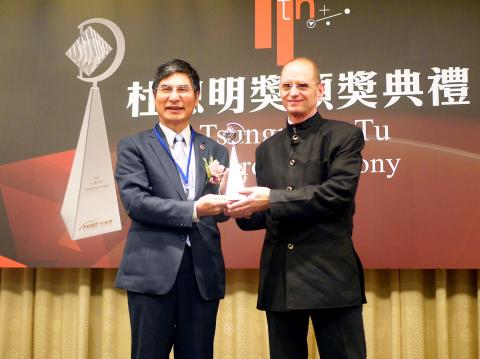Minister of Science and Technology Chen Liang-gee (陳良基) yesterday presented German plant molecular biologist Wolf Frommer with the 11th Tsungming Tu Award, the nation’s highest academic honor for foreign researchers, at a ceremony at Academia Sinica in Taipei.
The award — named after Tu Tsung-ming (杜聰明) — who in 1922 became the first Taiwanese to earn a doctorate and later founded Kaohsiung Medical University — was established in 2006.
Frommer, who was recommended by Academia Sinica’s Agricultural Biotechnology Research Center, is the sole winner this year.

Photo: Chien Hui-ju, Taipei Times
Winners of the award receive US$75,000, the ministry said, noting that 16 German academics have received the award since 2007.
Frommer previously served as an adviser to Academia Sinica’s Institute of Plant and Microbial Biology, and it expects to continue to collaborate with him, Academia Sinica Vice President Liu Fu-tong (劉扶東) said.
The 60-year-old Frommer, a member of Leopoldina, the German National Academy of Science, and a professor at Stanford University since 2003, is best known for his discovery of the so-called SWEET proteins that are related to sugar transportation in plant cells and his studies on fluorescent biosensors.
He returned to Germany in April last year to take up an Alexander von Humbolt professorship at Heinrich Heine University Dusseldorf, where he heads the Institute of Molecular Physiology.
In his speech at the ceremony, Frommer discussed water and food shortages around the world.
While such shortages are aggravated by climate change, it is “weird” that some people, especially in the US, say there is no such thing as climate change, he said, flashing a photograph of US President Donald Trump during his slide presentation.
To remedy food shortages and boost agricultural production, governments should allocate more funding to fundamental research on plant biology and promote “rational” engineering, he said.

Chinese spouse and influencer Guan Guan’s (關關) residency permit has been revoked for repeatedly posting pro-China videos that threaten national security, the National Immigration Agency confirmed today. Guan Guan has said many controversial statements in her videos posted to Douyin (抖音), including “the red flag will soon be painted all over Taiwan” and “Taiwan is an inseparable part of China,” and expressing hope for expedited reunification. The agency last year received multiple reports alleging that Guan Guan had advocated for armed reunification. After verifying the reports, the agency last month issued a notice requiring her to appear and explain her actions. Guan

A preclearance service to facilitate entry for people traveling to select airports in Japan would be available from Thursday next week to Feb. 25 at Taiwan Taoyuan International Airport, Taoyuan International Airport Corp (TIAC) said on Tuesday. The service was first made available to Taiwanese travelers throughout the winter vacation of 2024 and during the Lunar New Year holiday. In addition to flights to the Japanese cities of Hakodate, Asahikawa, Akita, Sendai, Niigata, Okayama, Takamatsu, Kumamoto and Kagoshima, the service would be available to travelers to Kobe and Oita. The service can be accessed by passengers of 15 flight routes operated by

GIVE AND TAKE: Blood demand continues to rise each year, while fewer young donors are available due to the nation’s falling birthrate, a doctor said Blood donors can redeem points earned from donations to obtain limited edition Formosan black bear travel mugs, the Kaohsiung Blood Center said yesterday, as it announced a goal of stocking 20,000 units of blood prior to the Lunar New Year. The last month of the lunar year is National Blood Donation Month, when local centers seek to stockpile blood for use during the Lunar New Year holiday. The blood demand in southern Taiwan — including Tainan and Kaohsiung, as well as Chiayi, Pingtung, Penghu and Taitung counties — is about 2,000 units per day, the center said. The donation campaign aims to boost

The Central Weather Administration (CWA) said a magnitude 4.9 earthquake that struck off the coast of eastern Taiwan yesterday was an independent event and part of a stress-adjustment process. The earthquake occurred at 4:47pm, with its epicenter at sea about 45.4km south of Yilan County Hall at a depth of 5.9km, the CWA said. The quake's intensity, which gauges the actual effects of a temblor, was highest in several townships in Yilan and neighboring Hualien County, where it measured 4 on Taiwan's seven-tier intensity scale, the CWA said. Lin Po-yu (林柏佑), a division chief at the CWA's Seismological Center, told a news conference